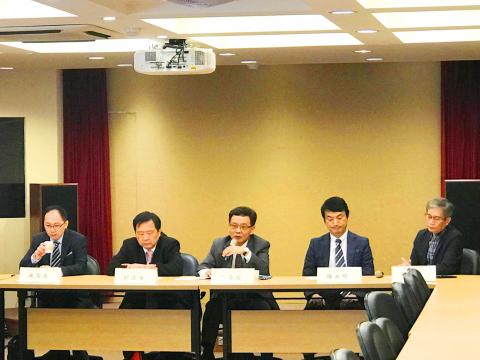National Taiwan University (NTU) yesterday expressed its strong objection and regret over the Ministry of Education’s decision the previous day to not approve the appointment of Kuan Chung-ming (管中閔) as school president.
NTU said in a statement that it had adhered to regulations throughout the election process, contrary to the reasons cited by the ministry for not appointing him.
Deputy Minister of Education Lin Teng-chiao (林騰蛟) on Friday cited conflict of interest as the main factor in the ministry’s decision not to confirm Kuan’s appointment.

Photo: Peng Wan-hsin, Taipei Times
Lin was referring to Kuan serving as an independent director on the board of Taiwan Mobile (台灣大哥大) during the election while Taiwan Mobile vice chairman Richard Tsai (蔡明興) was on the NTU president election committee.
Regarding whether NTU would accept the ministry’s decision and start a new election process, it only said that it would “act in accordance with the law” once it receives a written notice of the decision.
Minister of Education Wu Maw-kuen (吳茂昆) on Friday said the ministry would step in if any legal issues arise in the new election process.
Kuan had breached NTU regulations by not disclosing his role as an independent director at Taiwan Mobile while Tsai was sitting on the election committee, he said.
It is now up to the committee to verify the conflict of interest and decide whether Kuan should be nominated again, Wu said.
Kuan, who was scheduled to take office on Feb. 1, has declined to comment on the decision.
Wang Fan-sen (王汎森), former vice president of Academia Sinica and one of the candidates for NTU president who lost to Kuan, said in a text message on Friday that he would not run for school president.
Another candidate, former National Tsing Hua University vice president Wu Cheng-wen (吳誠文), also said that he would not run if the election process is marred by controversy and outside intervention.
The NTU student council has called for the implementation of “much-needed reforms” and has urged the school administration not to wait until a new president takes office.
The proposed reforms include introducing more gender-friendly facilities and clarifying the regulations pertaining to renting out the school’s gym and sports facilities, the student council said.

Conflict with Taiwan could leave China with “massive economic disruption, catastrophic military losses, significant social unrest, and devastating sanctions,” a US think tank said in a report released on Monday. The German Marshall Fund released a report titled If China Attacks Taiwan: The Consequences for China of “Minor Conflict” and “Major War” Scenarios. The report details the “massive” economic, military, social and international costs to China in the event of a minor conflict or major war with Taiwan, estimating that the Chinese People’s Liberation Army (PLA) could sustain losses of more than half of its active-duty ground forces, including 100,000 troops. Understanding Chinese

The Ministry of Foreign Affairs (MOFA) yesterday said it is closely monitoring developments in Venezuela, and would continue to cooperate with democratic allies and work together for regional and global security, stability, and prosperity. The remarks came after the US on Saturday launched a series of airstrikes in Venezuela and kidnapped Venezuelan President Nicolas Maduro, who was later flown to New York along with his wife. The pair face US charges related to drug trafficking and alleged cooperation with gangs designated as terrorist organizations. Maduro has denied the allegations. The ministry said that it is closely monitoring the political and economic situation

UNRELENTING: China attempted cyberattacks on Taiwan’s critical infrastructure 2.63 million times per day last year, up from 1.23 million in 2023, the NSB said China’s cyberarmy has long engaged in cyberattacks against Taiwan’s critical infrastructure, employing diverse and evolving tactics, the National Security Bureau (NSB) said yesterday, adding that cyberattacks on critical energy infrastructure last year increased 10-fold compared with the previous year. The NSB yesterday released a report titled Analysis on China’s Cyber Threats to Taiwan’s Critical Infrastructure in 2025, outlining the number of cyberattacks, major tactics and hacker groups. Taiwan’s national intelligence community identified a large number of cybersecurity incidents last year, the bureau said in a statement. China’s cyberarmy last year launched an average of 2.63 million intrusion attempts per day targeting Taiwan’s critical

AGING: As of last month, people aged 65 or older accounted for 20.06 percent of the total population and the number of couples who got married fell by 18,685 from 2024 Taiwan has surpassed South Korea as the country least willing to have children, with an annual crude birthrate of 4.62 per 1,000 people, Ministry of the Interior data showed yesterday. The nation was previously ranked the second-lowest country in terms of total fertility rate, or the average number of children a woman has in her lifetime. However, South Korea’s fertility rate began to recover from 2023, with total fertility rate rising from 0.72 and estimated to reach 0.82 to 0.85 by last year, and the crude birthrate projected at 6.7 per 1,000 people. Japan’s crude birthrate was projected to fall below six,